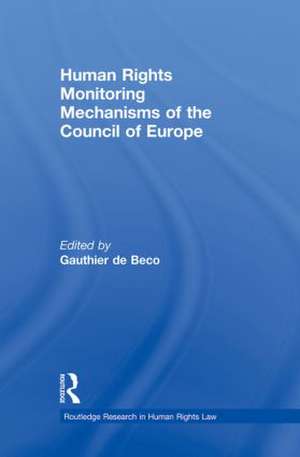Human Rights Monitoring Mechanisms of the Council of Europe: Routledge Research in Human Rights Law
Editat de Gauthier de Becoen Limba Engleză Paperback – 12 apr 2013
The human rights monitoring mechanisms of the Council of Europe seek to establish a permanent dialogue with governments to encourage them to better implement human rights treaties. They function principally through the use of national reports, on which basis they make recommendations, and may also visit or question states directly. The book looks at each mechanism in turn, discussing their composition, functions and working methods, as well as their relationship with other actors. It includes both a general discussion of the role of European human rights monitoring mechanisms as well as a comparative analysis of these mechanisms. The book aims to provide a clear understanding of the underlying approach of European human rights monitoring mechanisms and the challenges faced by them in terms of effectiveness. It will be useful for practitioners and students alike, especially those following courses in human rights or related fields.
| Toate formatele și edițiile | Preț | Express |
|---|---|---|
| Paperback (1) | 416.22 lei 6-8 săpt. | |
| Taylor & Francis – 12 apr 2013 | 416.22 lei 6-8 săpt. | |
| Hardback (1) | 1061.57 lei 6-8 săpt. | |
| Taylor & Francis – 15 iul 2011 | 1061.57 lei 6-8 săpt. |
Din seria Routledge Research in Human Rights Law
-
 Preț: 327.55 lei
Preț: 327.55 lei -
 Preț: 309.90 lei
Preț: 309.90 lei -
 Preț: 328.25 lei
Preț: 328.25 lei -
 Preț: 386.21 lei
Preț: 386.21 lei - 8%
 Preț: 388.56 lei
Preț: 388.56 lei -
 Preț: 312.02 lei
Preț: 312.02 lei - 20%
 Preț: 268.89 lei
Preț: 268.89 lei -
 Preț: 311.18 lei
Preț: 311.18 lei -
 Preț: 384.91 lei
Preț: 384.91 lei -
 Preț: 327.10 lei
Preț: 327.10 lei -
 Preț: 326.49 lei
Preț: 326.49 lei - 9%
 Preț: 936.56 lei
Preț: 936.56 lei -
 Preț: 319.01 lei
Preț: 319.01 lei -
 Preț: 341.55 lei
Preț: 341.55 lei - 18%
 Preț: 1167.58 lei
Preț: 1167.58 lei - 18%
 Preț: 1058.38 lei
Preț: 1058.38 lei - 18%
 Preț: 1058.65 lei
Preț: 1058.65 lei - 18%
 Preț: 1056.28 lei
Preț: 1056.28 lei - 26%
 Preț: 822.34 lei
Preț: 822.34 lei - 18%
 Preț: 1172.58 lei
Preț: 1172.58 lei - 25%
 Preț: 823.63 lei
Preț: 823.63 lei -
 Preț: 371.64 lei
Preț: 371.64 lei -
 Preț: 473.88 lei
Preț: 473.88 lei - 18%
 Preț: 1110.92 lei
Preț: 1110.92 lei - 26%
 Preț: 847.31 lei
Preț: 847.31 lei -
 Preț: 369.73 lei
Preț: 369.73 lei -
 Preț: 464.16 lei
Preț: 464.16 lei - 18%
 Preț: 1169.97 lei
Preț: 1169.97 lei - 25%
 Preț: 824.17 lei
Preț: 824.17 lei - 18%
 Preț: 1117.88 lei
Preț: 1117.88 lei - 18%
 Preț: 1057.57 lei
Preț: 1057.57 lei - 18%
 Preț: 1061.06 lei
Preț: 1061.06 lei - 18%
 Preț: 1111.58 lei
Preț: 1111.58 lei - 18%
 Preț: 1057.75 lei
Preț: 1057.75 lei - 18%
 Preț: 1109.18 lei
Preț: 1109.18 lei - 18%
 Preț: 1061.57 lei
Preț: 1061.57 lei -
 Preț: 475.16 lei
Preț: 475.16 lei - 18%
 Preț: 1059.48 lei
Preț: 1059.48 lei - 18%
 Preț: 1060.52 lei
Preț: 1060.52 lei -
 Preț: 414.32 lei
Preț: 414.32 lei - 18%
 Preț: 1053.92 lei
Preț: 1053.92 lei -
 Preț: 423.30 lei
Preț: 423.30 lei
Preț: 416.22 lei
Nou
Puncte Express: 624
Preț estimativ în valută:
79.65€ • 83.54$ • 66.30£
79.65€ • 83.54$ • 66.30£
Carte tipărită la comandă
Livrare economică 01-15 aprilie
Preluare comenzi: 021 569.72.76
Specificații
ISBN-13: 9780415859493
ISBN-10: 0415859492
Pagini: 264
Dimensiuni: 156 x 234 x 18 mm
Greutate: 0.45 kg
Ediția:1
Editura: Taylor & Francis
Colecția Routledge
Seria Routledge Research in Human Rights Law
Locul publicării:Oxford, United Kingdom
ISBN-10: 0415859492
Pagini: 264
Dimensiuni: 156 x 234 x 18 mm
Greutate: 0.45 kg
Ediția:1
Editura: Taylor & Francis
Colecția Routledge
Seria Routledge Research in Human Rights Law
Locul publicării:Oxford, United Kingdom
Public țintă
Postgraduate and UndergraduateCuprins
Preface by Thomas Hammarberg Introduction: The Role of European Human Rights Monitoring Mechanisms, Gauthier de Beco 1. The Commissioner for Human Rights, Lauri Sivonen 2. The European Committee for the Prevention of Torture and Inhuman or Degrading Treatment or Punishment (The CPT), Renate Kicker 3. The European Committee of Social Rights (The ECSR), Olivier De Schutter and Matthias Sant’Ana 4. The Advisory Committee on the Framework Convention for the Protection of National Minorities (The ACFC), Gauthier de Beco and Emma Lantschner 5. The European Commission against Racism and Intolerance (ECRI), Lanna Yael Hollo 6. the Committee of Experts of the European Charter for Regional or Minority Languages (The CECL), Robert Dunbar Conclusion: A Comparative Analysis of European Human Rights Monitoring Mechanisms, Gauthier de Beco
Descriere
This book explores the human rights monitoring mechanisms of the Council of Europe: the Commissioner for Human Rights, the European Committee for the Prevention of Torture and Inhuman or Degrading Treatment or Punishment, the European Committee of Social Rights, the Advisory Committee on the Framework Convention for the Protection of National Minorities, the Committee of Experts of the European Charter for Regional or Minority Languages, the European Commission against Racism and Intolerance.
The book will look at each mechanism in turn and consider a number of issues including: at the role and procedures; its effectiveness in terms of monitoring ands ensuring its findings are implemented; its level of cooperation with other international actors including other organs of the Council of Europe, UN and EU bodies, NGOs and national human rights institutions and ombudsmen; its relationship with the European Court of Human Rights; and whether human rights indicators would be useful in improving its monitoring. Each chapter will be written by an expert in the field. The introduction to the volume will outline the common features and purposes of these mechanisms as well as key questions to be addressed in the following chapters, while the conclusion will provide an evaluation of their effectiveness and consider future perspectives.
The book will look at each mechanism in turn and consider a number of issues including: at the role and procedures; its effectiveness in terms of monitoring ands ensuring its findings are implemented; its level of cooperation with other international actors including other organs of the Council of Europe, UN and EU bodies, NGOs and national human rights institutions and ombudsmen; its relationship with the European Court of Human Rights; and whether human rights indicators would be useful in improving its monitoring. Each chapter will be written by an expert in the field. The introduction to the volume will outline the common features and purposes of these mechanisms as well as key questions to be addressed in the following chapters, while the conclusion will provide an evaluation of their effectiveness and consider future perspectives.















